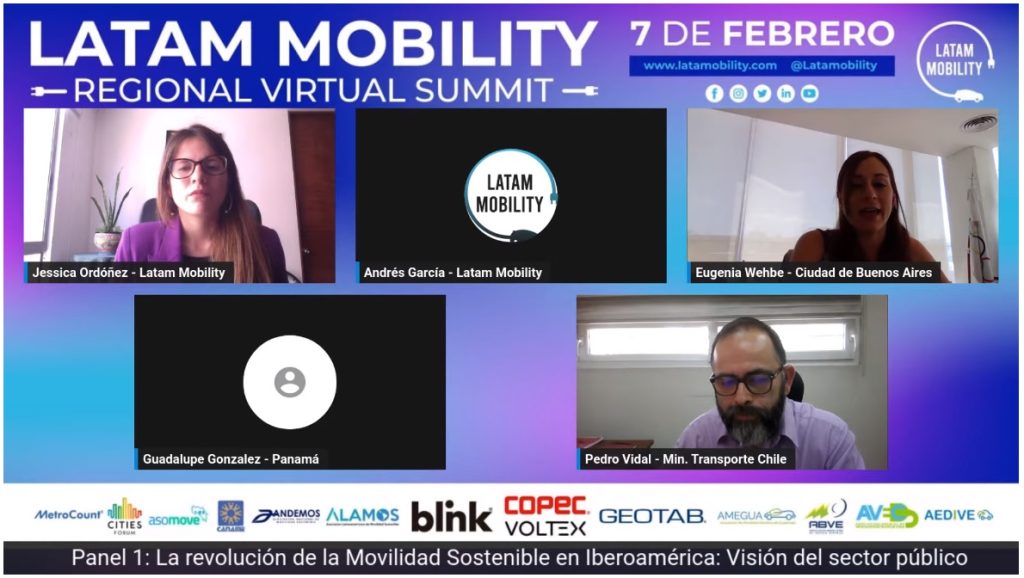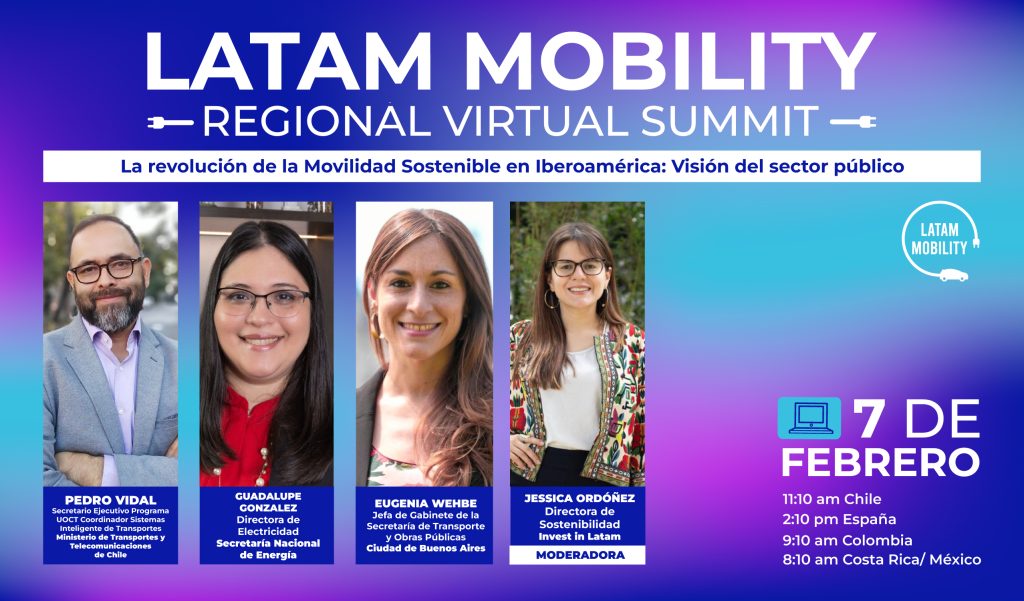Latam Mobility, the largest sustainable mobility community in Latin America, kicked off its “Tour 2023” with the “Regional Virtual Summit“, which was attended by distinguished representatives from the public and private sectors, who addressed a series of topics related to the current situation and prospects of transportation, charging infrastructure, fleet solutions and electric passenger vehicles, among others.
The first panel of the virtual meeting, entitled “The Sustainable Mobility Revolution in Ibero-America: Vision of the Public Sector“, had as guests Eugenia Wehbe, Chief of Staff of the Secretariat of Transport and Public Works of Buenos Aires; Guadalupe González, Electricity Director of the National Secretariat of Energy of Panama, and Pedro Vidal, Intelligent Transport Systems Coordinator of the Ministry of Transport and Telecommunications of Chile, under the moderation of Jessica Ordóñez, Sustainability Director of Invest in Latam.
You may also be interested in: Mexico Set Up Working Group for the Electric Transportation
Local Emphasis
Pedro Vidal, representative of the Chilean Ministry of Transport and Telecommunications, indicated that the government of President Gabriel Boric has focused on the decentralization of ministerial competencies to regional governments, and that they require a more local emphasis that impacts the territories.
“Last year, transit competencies were transferred to local governments, which implies a challenge, since governance issues are relevant when making decisions in the field of mobility. In addition, relevant strategic lines have been defined, such as promoting public transport from the people’s point of view: aiming at equity, efficiency and sustainability; reducing the risks of traffic accidents, and including new technologies“, said Vidal.
He also indicated that the National Strategy for Sustainable Mobility in Chile was launched in 2022. “It seeks to improve the decisions that are made from the point of view of territorial planning and mobility, to connect them and make them more efficient, and amplify the impact that public policies associated with mobility issues have, as well as address climate change and the organization of the transportation system.”

Planning and Management
Eugenia Wehbe, Chief of Staff of the Secretariat of Transport and Public Works of the city of Buenos Aires, indicated that the pandemic changed the way users moved around, with a decrease in the use of traditional means of transport and an increase in other more sustainable means, such as bicycles.
“After the pandemic, we decided to incorporate innovative solutions that help the urban interventions we make to improve mobility in the city, sustainability and real-time traffic management. We have two major plans: the Sustainable Mobility Plan, which includes the promotion of public transportation, carpooling and micro-mobility; and the Hydraulic Plan, which has the function of not only mitigating the impact of rain within the city, but also changes by reconfiguring the physiognomy of the city, with new streets, absorbent soils, and more greenery around it.”
Wehbe also explained that as representatives of the city of Buenos Aires they have challenges. “We must work with planning and traffic management tools, with the use of massive data, to reduce costs, reduce emissions, and advance in travel planning. In addition, we work for the gender perspective and the inclusion of areas that did not have public transportation.”
Joint Work
Guadalupe González, Electricity Director of Panama’s National Energy Secretariat, pointed out that they are working hard on the National Electric Mobility Strategy. “In April 2022, the Electric Mobility Incentives Law was approved, and we are currently working on its regulations, which should be made public by executive decree in the first half of the year. In addition, work is being done on two articles of the law that are under the authority of Public Utilities.”
“We are laying the legal and regulatory foundations for electric mobility in Panama. On the other hand, the entity has worked hand in hand with State institutions to gradually increase the number of charging stations, which went from three in 2019 to 164 at present nationwide, and it is worth highlighting that they are all private investment, which have trusted in the policies that have been implemented in the country.”
“One of the challenges for this year is the supply of electric vehicles in the country. In 2020, the accumulated number of vehicles sold since 2015 was 70; in 2021, 80 were sold; in 2022, 60; and in 2023, we expect to double and even triple that number. However, we do not have enough supply, so we are in contact with distributors, as well as developing framework agreements with state institutions, since the government must set an example in the introduction of these new technologies”, emphasized the representative.




